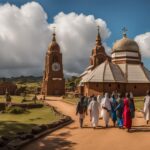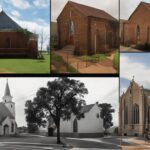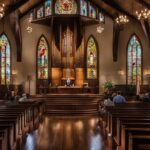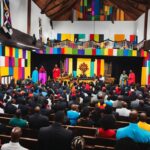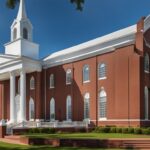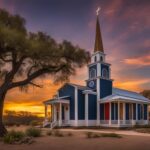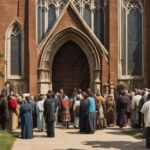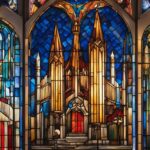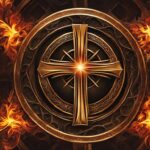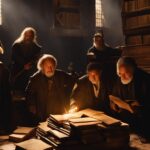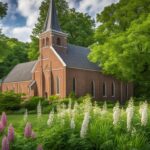The Zion Christian Church (ZCC) is a prominent African-initiated church that has a rich history and a significant presence across Southern Africa. Established in 1910 by Engenas Lekganyane, the ZCC has grown into one of the largest indigenous religious movements in the region. With its headquarters located at Zion City Moria in Limpopo Province, South Africa, the church has millions of members and branches in various locations, including the United States.
The ZCC is renowned for its fusion of African traditions and Protestant Christian faith, creating a unique spiritual experience for its followers. The church places special emphasis on prophecy, healing, and spiritual counseling, providing a source of inspiration and support for its devoted congregation.
Key Takeaways:
- The Zion Christian Church (ZCC) is one of the largest African-initiated churches in Southern Africa, with its headquarters in South Africa.
- The ZCC combines African traditions with Protestant Christian faith, emphasizing prophecy, healing, and spiritual counseling.
- The church practices baptism, confession, and redemption as part of its sacraments and rituals.
- Leadership in the ZCC has been passed down through generations of the Lekganyane family, with Bishop Barnabas Lekganyane currently leading the church.
- Worship in the ZCC involves singing, dancing, and prayer, with the annual Easter pilgrimage at Moria City as a significant event.
Origins and Early Years
In the early 1900s, a remarkable figure by the name of Engenas Lekganyane emerged and laid the foundation for what would become the monumental Zion Christian Church (ZCC). Inspired by a divine revelation, Engenas embarked on a spiritual journey that would lead to the establishment of a new religious movement.
Engenas, initially affiliated with the Zion Apostolic Church, experienced a life-changing vision atop Mt Thabakgone in 1910. This revelation prompted him to venture out and form his own congregation in his hometown, located in the Northern Transvaal region.
Facing numerous obstacles and opposition, Engenas persevered and managed to acquire land in the Polokwane area. It was on this land that he founded the ZCC and established its headquarters, known as Moria. With around twenty congregations in Northern Transvaal, Witwatersrand, and Rhodesia, the ZCC began to solidify its presence and spread its message of faith and spirituality.
“Engenas Lekganyane, the visionary leader of the ZCC, overcame adversity to establish the church and lay the groundwork for its remarkable growth.”
Despite the challenges, Engenas’s unwavering dedication and his genuine connection with the divine inspired many to join the ZCC. Through his teachings and leadership, the church gained momentum and started to attract a devoted following of believers seeking salvation and spiritual guidance.
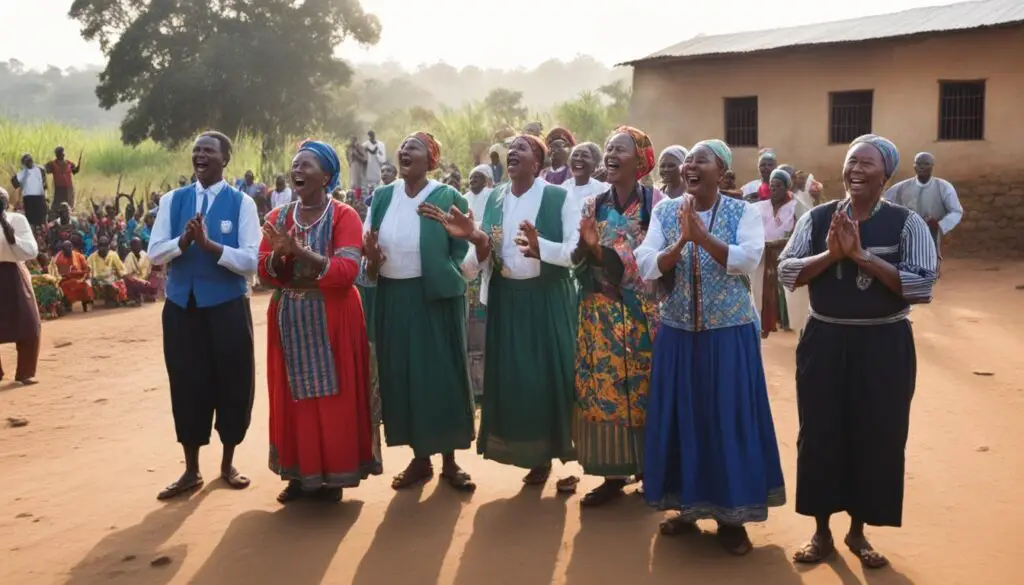
Early Growth and Expansion
As the ZCC community grew, so did its impact. Engenas’s teachings resonated with individuals who yearned for a unique blend of African traditions and Christian faith, leading to an exponential increase in membership.
In the early years, the ZCC spread primarily across the Northern Transvaal, reaching believers in rural areas as well as urban townships. The church’s focus on prophecy, healing, and spiritual counseling attracted those seeking a deeper connection with the divine and a sense of belonging within a supportive community.
Engenas Lekganyane’s trailblazing efforts set the stage for the future growth and prominence of the ZCC, transcending regional boundaries and becoming a beacon of hope for millions across Southern Africa.
| Key Points | Details |
|---|---|
| Founder | Engenas Lekganyane |
| Year of Establishment | 1910 |
| Origins | Engenas’ revelation on Mt Thabakgone |
| Initial Affiliation | Zion Apostolic Church |
| Headquarters | Moria, Polokwane |
| Early Congregations | Approximately 20 in Northern Transvaal, Witwatersrand, and Rhodesia |
Beliefs and Doctrines
The ZCC Church is a unique African-initiated church that merges traditional African beliefs with Protestant Christian faith. Influenced by the doctrines of the Christian Catholic Church and the teachings of Pentecostal missionary John G. Lake, the ZCC Church encompasses a range of beliefs and practices that set it apart.
At the core of ZCC Church beliefs is the emphasis on prophecy, the power of healing, and spiritual counseling. The church places great importance on the role of prophets, who are believed to have a direct line of communication with God and the ability to foresee future events. This belief in prophecy provides guidance and spiritual encouragement to members of the church.
Healing is another significant aspect of ZCC Church beliefs. The church practices faith healing through the laying-on of hands, the use of holy water, and the drinking of blessed tea and coffee. ZCC members believe in the power of divine intervention through these rituals and seek healing for physical and spiritual ailments.
Furthermore, the ZCC Church promotes peace, respect, and love for God as essential values in the lives of its members. These values are instilled through the teachings and spiritual counseling provided by the church’s clergy. The church believes that by embodying these virtues, individuals are able to lead fulfilling lives and contribute positively to their communities.
The fusion of African traditions with Protestant Christian faith allows the ZCC Church to create a unique spiritual experience for its members. It draws upon the rich cultural heritage of its followers while providing a framework for practicing and expressing their Christian beliefs.
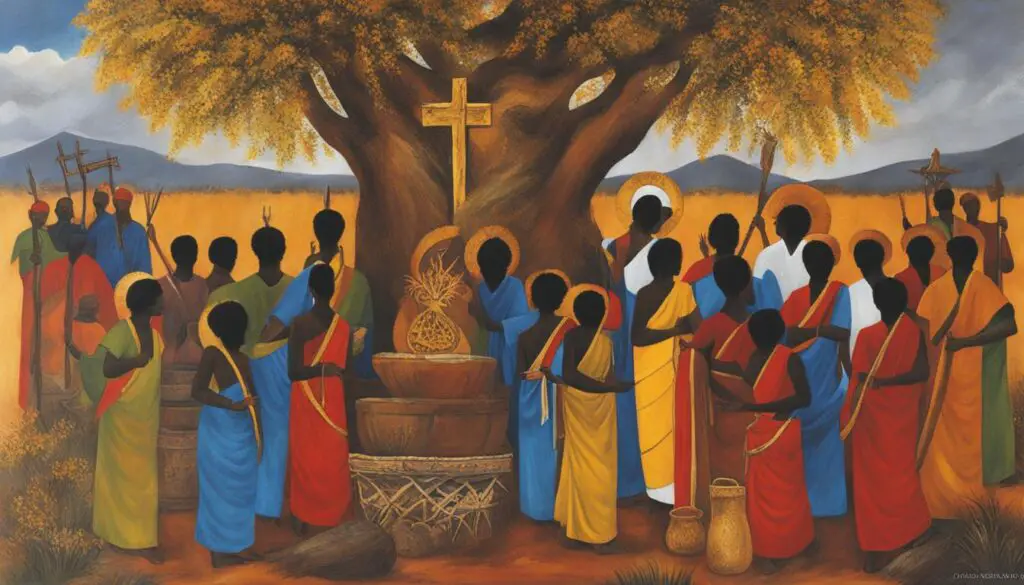
“The ZCC Church combines the spiritual richness of African Zionism with the core tenets of the Christian Catholic Church and the teachings of John G. Lake. The beliefs and practices of the church revolve around prophecy, healing, and spiritual counseling, empowering members to lead spiritually enriched lives full of peace, respect, and love for God.”
Sacraments and Rituals
The ZCC Church places great importance on the practice of sacraments and rituals, which hold significant spiritual and transformative meaning for its members. These sacred acts serve as powerful conduits for connection with God and the attainment of redemption. Among the sacraments practiced by the ZCC Church are:
Baptism
Baptism is considered a crucial sacrament for salvation within the ZCC Church. It symbolizes the cleansing and rebirth of one’s soul and is performed through immersion in water three times in the name of the Father, the Son, and the Holy Spirit. Through baptism, individuals publicly declare their commitment to the ZCC faith and its teachings.
Confession, Repentance, and Prayer
The ZCC Church believes in the power of confession, repentance, and prayer as means to attain redemption and spiritual growth. Through honest self-reflection, acknowledging one’s sins, and seeking forgiveness from God, individuals can experience a deep sense of cleansing and renewal. Prayer acts as a conduit for communication with God, allowing believers to seek guidance, express gratitude, and find solace in times of need.
In addition to these sacraments, the ZCC Church practices various rituals that foster spiritual connection and healing:
Prophets and Prophecies
The ZCC Church places a strong belief in the power of prophets and prophecies. Prophets are regarded as divine intermediaries, blessed with the ability to interpret God’s will and provide spiritual guidance to the community. Prophecies serve as messages from God, offering insight, comfort, and direction for individual believers and the entire congregation.
Faith Healing and Cleansing
The ZCC Church incorporates faith healing and cleansing practices, believing in the ability of spiritual rituals to bring about physical, emotional, and spiritual restoration. Such practices may include the use of holy water, which is believed to possess purifying properties, as well as the consumption of blessed tea or coffee. These rituals aim to cleanse the body, mind, and spirit, promoting overall well-being and a deep connection with God.
The ZCC Church sacraments and rituals are deeply rooted in the belief that through these practices, believers can experience spiritual transformation, obtain redemption, and strengthen their relationship with God.

Leadership and Clergy
The leadership of the ZCC Church plays a vital role in guiding the congregation and shaping the direction of the church’s activities. From its inception, the ZCC has been led by influential figures who have carried forward the legacy of its founder, Engenas Lekganyane.
Engenas Lekganyane, a visionary and spiritual leader, established the ZCC Church in 1910. He served as the first leader of the church, laying the foundation for its growth and prominence. After his passing, a significant split occurred within the church, resulting in two factions led by his sons Edward Lekganyane and Joseph Lekganyane.
Edward Lekganyane assumed leadership of one faction, bringing about significant changes within the ZCC. Under his guidance, the church experienced growth and established the Mokhukhu organization, an all-male society responsible for amplifying the church’s teachings and supporting its activities.
Today, the ZCC Church is led by Bishop Barnabas Lekganyane, the grandson of Engenas Lekganyane. As the current leader, Bishop Barnabas continues to uphold the principles and values of the ZCC while adapting to the evolving needs of the congregation.
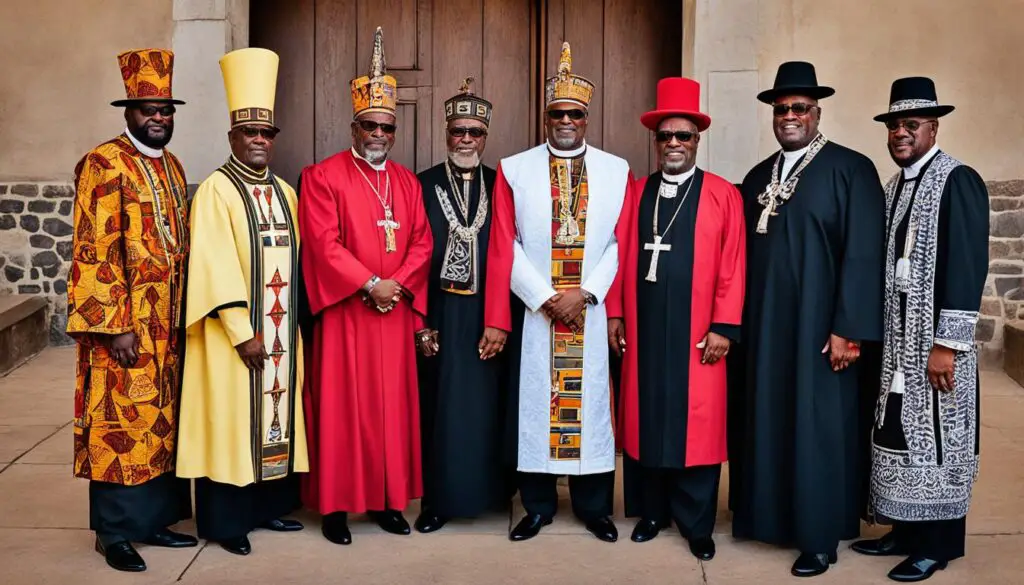
Clergy
The ZCC Church is supported by a dedicated clergy who ensure the smooth functioning of the church and provide spiritual guidance to its members. The clergy, including bishops, priests, pastors, and deacons, hold integral roles in administering sacraments, conducting rituals, and leading worship services.
These clergy members undergo rigorous training to acquire the necessary knowledge and skills to fulfill their roles effectively. They are responsible for maintaining the sanctity of the church, fostering a sense of community, and ministering to the spiritual needs of the congregation.
| Position | Responsibilities |
|---|---|
| Bishops | Oversee the overall administration of the church and provide guidance to other clergy members. |
| Priests | Lead worship services, perform sacraments, and provide spiritual counseling to church members. |
| Pastors | Take charge of specific congregations within the church, preach sermons, and guide the spiritual growth of the congregation. |
| Deacons | Assist in the smooth functioning of the church, perform administrative tasks, and support the clergy in their duties. |
The clergy members of the ZCC Church are revered and respected for their dedication to the church and their commitment to serving the community. They play an essential role in preserving the traditions and values of the church, ensuring that the ZCC continues to flourish under their leadership and guidance.
Worship Practices
The worship practices of the ZCC Church are vibrant and deeply rooted in their faith. One of the most significant events on their religious calendar is the Easter pilgrimage to Moria City, the spiritual capital of the church. During this time, millions of ZCC members from across Southern Africa gather for several days of religious services and festivities. It is a time of great spiritual connection, unity, and renewal for the believers.
Music plays a central role in ZCC worship. Singing is a powerful expression of devotion and praise, bringing believers together in harmonious melodies that resonate throughout the congregation. The uplifting rhythms and soul-stirring melodies create an atmosphere of joy and reverence, inviting the presence of the Holy Spirit. Dancing is also an integral part of ZCC worship, allowing worshippers to express their faith through movement and celebrate the blessings bestowed upon them.
Prayer is another fundamental aspect of ZCC worship. Believers engage in fervent and heartfelt prayer, communicating with God and seeking guidance, healing, and spiritual growth. Prayer serves as a means of connecting with the divine and finding solace and strength in the face of life’s challenges. It is through prayer that ZCC members deepen their relationship with God and foster a sense of unity within the church community.
The ZCC Church also holds deep respect for traditional African religious beliefs, particularly regarding the role of ancestors. They understand the importance of ancestral connection and honoring the spirits of those who came before them. This reverence for ancestry is intertwined with their worship practices and is seen as an integral part of their spiritual journey.
| Worship Practices | Description |
|---|---|
| Singing | Believers engage in uplifting songs that express their devotion and praise. |
| Dancing | Worshippers use movement to celebrate their faith and express gratitude for blessings. |
| Prayer | Members connect with God, seek guidance, and find solace through heartfelt prayer. |
| Traditional Beliefs | The ZCC Church respects ancestral connections and incorporates traditional beliefs in worship. |
Sacred Texts
In the Zion Christian Church (ZCC), the sacred text that holds utmost importance is the Bible. The ZCC follows the teachings of Jesus Christ as laid out in the Bible, embracing it as their spiritual guide. The Bible serves as a cornerstone, providing direction and guidance in matters of faith and doctrine.
However, the ZCC is also known for its commitment to secrecy and the limited dissemination of its written materials. Church writings are considered confidential and are restricted to members of the church. This exclusivity contributes to the preservation of the church’s teachings and practices, safeguarding them from misinterpretation or misrepresentation.
The secrecy surrounding the ZCC’s written materials has led to misunderstandings and misconceptions about the church among external scholars and writers. Without access to authentic and accurate information, these individuals may struggle to fully comprehend the intricate beliefs and practices of the ZCC.
Despite the limited availability of church writings, the ZCC strives to ensure that its members have access to the necessary texts to deepen their spiritual understanding. This approach allows for the preservation of the church’s teachings while fostering a sense of unity and trust within the ZCC community.
The sacred text of the ZCC is the Bible, adhering to the teachings of Jesus Christ. The church maintains a sense of secrecy surrounding its written materials, restricting access to members and preserving the authenticity of its teachings.
Denominations and Sects
The ZCC, being a prominent African-initiated church, has diversified into different denominations and sects over time. The two main branches of the ZCC are the main church led by Bishop Barnabas Lekganyane and the St. Engenas ZCC led by Bishop Engenas Lekganyane’s namesake and great-grandson. Both branches have their headquarters at Moria City, the spiritual capital of the ZCC.
These denominations share similar theological beliefs, grounded in the fusion of African traditions and Protestant Christian faith. However, each branch holds separate pilgrimages and events to cater to their respective congregations.
Differences and Similarities in Beliefs
While the ZCC denominations share core beliefs such as prophecy, healing, and spiritual counseling, there may also be some doctrinal variations influenced by the leadership of their respective bishops. These differences in emphasis and interpretation contribute to the diverse expressions of the ZCC within its denominations and sects.
| Denomination/Sect | Leader | Headquarters |
|---|---|---|
| Main ZCC | Bishop Barnabas Lekganyane | Moria City |
| St. Engenas ZCC | Bishop Engenas Lekganyane | Moria City |
These denominations and sects within the ZCC highlight the growth and influence of the church over the years, overshadowing many traditional Protestant churches in the region. The diverse expressions of the ZCC reflect the multifaceted nature of African spirituality within the broader Christian faith.
Conclusion
The Zion Christian Church (ZCC) has made a remarkable impact across southern Africa, with its fusion of African traditions and Protestant Christian faith. With millions of members and a strong presence in both urban and rural communities, the ZCC continues to thrive and shape the religious landscape of the region.
The church’s emphasis on prophecy and healing has resonated with many people, offering a unique spiritual experience that combines ancient African beliefs with modern Christianity. Through its adherence to traditional beliefs and practices, the ZCC has cultivated a deep sense of community and engagement among its members.
Despite challenges and misconceptions, the ZCC has experienced significant growth and continues to inspire and connect with individuals from all walks of life. Its enduring popularity can be attributed to its commitment to traditional values, its unique worship practices, and its ability to provide spiritual guidance and support to its followers.
FAQ
What is the history of the ZCC Church?
The Zion Christian Church (ZCC) is one of the largest African-initiated churches operating across Southern Africa. It was founded in 1910 by Engenas Lekganyane and is headquartered at Zion City Moria in Limpopo Province, South Africa.
Where did the ZCC Church originate?
The ZCC Church originated in the Northern Transvaal region of South Africa. It was founded by Engenas Lekganyane, who started his religious journey after receiving a revelation from God on the top of Mt Thabakgone. He was initially part of the Zion Apostolic Church but eventually established his own congregation in his home village.
What are the beliefs and doctrines of the ZCC Church?
The ZCC Church combines African traditions and values with Protestant Christian faith. It was influenced by the doctrines of the Christian Catholic Church and the teachings of Pentecostal missionary John G. Lake. The ZCC believes in prophecy, the power of healing, and spiritual counseling.
What sacraments and rituals does the ZCC Church practice?
The ZCC Church practices several sacraments and rituals. Baptism is considered essential for salvation, involving immersion in water three times in the name of the Father, the Son, and the Holy Spirit. Redemption is obtained through confession, repentance, and prayer. The church also places a strong belief in the power of prophets and prophecies.
Who are the leaders and clergy of the ZCC Church?
Engenas Lekganyane was the founder and first leader of the ZCC Church. After his death, a major split occurred, with his oldest surviving son, Edward Lekganyane, becoming the leader of one faction, and his younger son, Joseph, forming a separate church. Currently, the church is led by Bishop Barnabas Lekganyane, the grandson of the founder.
What are the worship practices of the ZCC Church?
Worship in the ZCC Church involves singing, dancing, and prayer. The highlight of their religious calendar is the Easter celebration, where millions of ZCC members gather at Moria City for several days of religious services. The church places great emphasis on the power of faith and the healing abilities of religious faith.
What are the sacred texts of the ZCC Church?
The ZCC Church regards the Bible as its sacred text and follows the teachings of Jesus Christ as laid out in the Bible. However, the church has been known for its secrecy and limited dissemination of its written materials. Church writings are restricted to members and are not available in public libraries.
Are there different denominations or sects within the ZCC Church?
The ZCC Church has two main branches, with their headquarters at Moria City. The main branch is led by Bishop Barnabas Lekganyane, while the St. Engenas ZCC is led by Bishop Engenas Lekganyane’s namesake and great-grandson. Although they share similar beliefs, they hold separate pilgrimages and events.
What impact has the ZCC Church had in Africa?
The ZCC Church has had a profound impact across southern Africa, with millions of members and a significant presence in urban townships and rural communities. The church’s fusion of African traditions with Protestant Christian faith, along with its emphasis on prophecy and healing, has resonated with many people.

